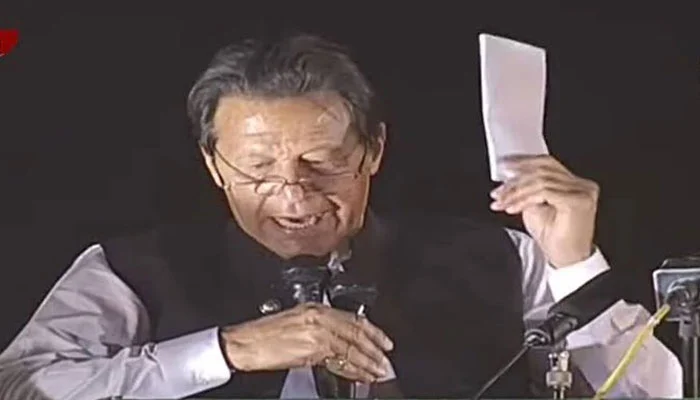FIA prosecutor says Imran Khan has confessed to his “crime”.
“PTI chief symbolically waved just a paper,” argues his counsel.
Special court will indict Imran Khan in cipher case tomorrow.
The Islamabad High Court (IHC) on Monday reserved its verdict on incarcerated Pakistan Tehreek-e-Insaf (PTI) Chairman Imran Khan’s petitions seeking post-arrest bail and quashing the cipher case against him.
The development came a day before a special court set up to try cases under the Official Secrets Act will indict the former prime minister — who was ousted from office in April 2022 through a vote of no-confidence — and PTI’s Vice Chairman Shah Mahmood Qureshi in the diplomatic cable case.
The special court had set October 17 as a date to frame charges against the duo in the case last week. Special court judge Abual Hasnat Muhammad Zulqarnain will resume hearing the case in Rawalpindi’s Adiala jail tomorrow (Tuesday).
On August 18, the ousted premier was booked under the Official Secrets Act 1923 in the cipher case after the Federal Investigation Agency (FIA) invoked Section 5 of the said law. The diplomatic cable reportedly went missing from Khan’s possession. According to the former ruling party, the cable contained a threat from the US to topple the PTI’s government.
Imran Khan is currently in Adiala jail on judicial remand in the cipher case. He was taken into custody after being sentenced to three years in prison in the Toshakhana case on August 5, 2023. Initially, he was kept in Attock jail but later he was moved to Adiala jail on his request.
It is pertinent to mention here that the IHC on August 29 had suspended the sentence handed down to the PTI chairman in the Toshakhana case.
At the outset of today’s hearing, FIA’s special prosecutor said: “It is a case in which the suspect [Khan] confessed to his crime after committing it.”
Giving his arguments, the prosecutor said that the Official Secrets Act 2023 proposes a maximum punishment of 14 years in prison or the death penalty for making the secret documents public.
At this, Sardar Latif Khosa — Khan’s counsel — argued that his client did not make public the diplomatic cable, adding that Khan had symbolically waved just a paper in the air.
Days before his ouster from the government, then prime minister — on March 7, 2022 — had brandished a letter before the crowd at the Parade Ground in Islamabad, claiming that it was a cipher of what he had claimed contained “evidence” of a foreign conspiracy against his government.
The FIA prosecutor, however, argued that the cipher was a secret document and the information it contained could not be made public.
PTI urges CJP to take notice
Terming Khan a “prisoner of conscience”, the PTI claimed that the imprisoned ex-prime minister was being subjected to the worst kind of political victimization through the poorest judicial process.
The former ruling party also strongly condemned the “murder of requirement of justice” to subject Khan to political victimisation, read a statement issued after the party’s core committee meeting.
The former ruling party urged Chief Justice of Pakistan (CJP) Qazi Faez Isa to take immediate notice of the situation.
Apparently, the Judiciary, especially the top court, has failed miserably in upholding the Constitution and protecting the fundamental rights ensured in it, read the statement.
Referring to the court’s proceedings in the cipher case, the PTI says it seems that the state bent upon sentencing Khan via a predetermined decision like in the Toshakhana case.
The case
The controversy first emerged on March 27, 2022, when Khan — less than a month before his ouster in April 2022 — while addressing a public rally waved a letter before the crowd, claiming that it was a cipher from a foreign nation that had conspired with his political rivals to have PTI government overthrown.
He did not reveal the contents of the letter nor did he mention the name of the nation it came from. But a few days later, he accused the United States of conspiring against him and alleged that Assistant Secretary of State for South and Central Asia Affairs Donald Lu had sought his removal.
The cipher was about former Pakistan ambassador to the US Majeed’s meeting with Lu.
The ousted premier, claiming that he was reading contents from the cipher, said that “all will be forgiven for Pakistan if Imran Khan is removed from power”.
Then on March 31, the National Security Committee (NSC) took up the matter and decided to issue a “strong demarche” to the US for its “blatant interference in the internal affairs of Pakistan”.
Later, after his removal, then-prime minister Shehbaz Sharif convened a meeting of the NSC, which came to the conclusion that it had found no evidence of a foreign conspiracy in the cable.
In the two audio leaks that took the internet by storm and shocked the public after these events, the former prime minister, then-federal minister Asad Umar, and then-principle secretary Azam could allegedly be heard discussing the US cipher and how to use it to their advantage.
On September 30, the federal cabinet took notice of the matter and constituted a committee to probe the contents of the audio leaks.
In October, the cabinet gave the green signal to initiate action against the former prime minister and handed over the case to the FIA.
Once FIA was given the task to probe the matter, it summoned Khan, Umar, and other leaders of the party, but the PTI chief challenged the summons and secured a stay order from the court.
The Lahore High Court (LHC), in July this year, recalled the stay order against the call-up notice to Khan by the FIA.

